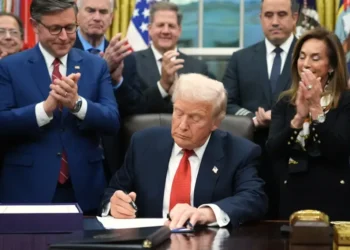The Struggling Anti-Trump Movement: Is There Still Hope?
The anti-Trump movement is losing ground and struggling to stay relevant in the face of his strong resurgence within the Republican Party. Following Donald Trump’s decisive victory, he quickly consolidated power and pushed his agenda forward, leaving the resistance, particularly those who once criticized him, scrambling to regain their influence.
The so-called “Never Trump” movement, which includes former Republicans and other Trump critics, is now fragmented. While some, like former U.N. Ambassador Nikki Haley, have tried to challenge Trump’s appointees, their efforts seem largely ineffective as Trump dominates the GOP and reshapes Washington in his own image.
Recently, Haley attacked Trump’s appointments, including figures like Tulsi Gabbard and Robert F. Kennedy Jr., on her radio show, labeling them as unqualified for their positions. Former Virginia Rep. Barbara Comstock also criticized Trump’s Cabinet choices, calling them dangerous. Meanwhile, former Vice President Mike Pence has expressed concerns about Kennedy, particularly regarding his views on abortion, attempting to rally anti-abortion conservatives against him. However, these voices of opposition have little impact as Trump’s grip on the Republican Party tightens.

Trump’s win and his swift consolidation of power have sidelined many of his critics, particularly those who once opposed him from within the party. Figures like Haley and Pence, who still find common ground with Trump on some issues, hold onto the hope that they can influence the GOP. But for many others who were part of the original Never Trump faction, the idea of reforming the Republican Party is no longer viable. Joe Walsh, a former GOP congressman and Trump critic, believes that Trump’s reelection has made the idea of forming a new party unrealistic, with few remaining options for critics—either continue to challenge his policies from the sidelines or shift toward the Democratic Party.
Despite this, Trump’s critics are attempting to remain relevant by targeting his cabinet picks and trying to maintain their political influence. Haley, for example, voiced her concerns about Gabbard and Kennedy on her radio show, criticizing their foreign policy views and lack of qualifications for their posts. However, Trump’s camp is less concerned with such opposition, with figures like Mike Davis, a former Senate GOP aide, dismissing their criticism as irrelevant.

Trump’s opponents are increasingly looking to Congress to act as a check on his power. Early signs of resistance, like Senate Republicans selecting John Thune over Rick Scott for majority leader despite Trump’s backing of Scott, offer some hope. But as Trump prepares to resume office in January, congressional Republicans may be less inclined to defy him. Public opposition risks angering Trump’s base and inviting primary challenges, making it difficult for senators to oppose him without political consequences.
The remaining anti-Trump voices in the Senate—such as Senators Susan Collins and Lisa Murkowski—are unlikely to be enough to stop Trump’s nominations. The GOP’s increasing alignment with Trump means that the last pockets of resistance, particularly in Congress, may eventually fade, leaving little room for opposition to his agenda. For the broader Trump resistance, the question remains: can they hold the line, or will they be swept aside as Trump reasserts his dominance over the party?
Top picture credit: Francis Chung/POLITICO
This article was rewritten by JournosNews.com based on verified reporting from trusted sources. The content has been independently reviewed, fact-checked, and edited for accuracy, neutrality, tone, and global readability in accordance with Google News and AdSense standards.
All opinions, quotes, or statements from contributors, experts, or sourced organizations do not necessarily reflect the views of JournosNews.com. JournosNews.com maintains full editorial independence from any external funders, sponsors, or organizations.
Stay informed with JournosNews.com — your trusted source for verified global reporting and in-depth analysis. Follow us on Google News, BlueSky, and X for real-time updates.














